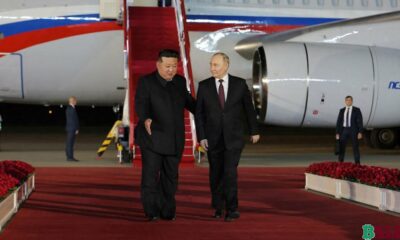World
Cease-Fire Negotiations Intensify Amidst Israel-Hamas Tensions
Explore the escalating cease-fire negotiations as tensions between Israel and Hamas reach a critical peak. Discover the implications for regional stability and the potential paths to peace in this complex and evolving conflict.

Cease-Fire Efforts Amidst Rising Tensions in the Middle East
A day after significant cross-border clashes between Israel and Hezbollah, both sides took steps to avert a larger conflict. The attention in the Middle East shifted back to the urgent pursuit of a cease-fire in Gaza, where Israel’s prolonged 10-month war with Hamas continues to escalate regional tensions.
After four days of diplomatic discussions that concluded on Sunday, no substantial progress was made. Senior officials from both Israel and Hamas convened in Cairo to engage with mediators, but the gap between the two factions remains significant. Despite a vigorous diplomatic effort spearheaded by the Biden administration, critical issues persist, including Israel’s insistence on maintaining a military presence along Gaza’s border with Egypt. This demand has been met with strong opposition from both Hamas and Egypt, who are actively mediating the talks alongside Qatar and the United States.
A U.S. official, who spoke on the condition of anonymity due to the sensitive nature of the negotiations, described the high-level discussions in Cairo as constructive, emphasizing that they are set to continue with working-group meetings in the upcoming days. Interestingly, Hamas officials have historically refrained from direct engagement in meetings with Israeli and U.S. representatives.
In Cairo, negotiators are focused on refining an American proposal that was initially presented last week in Doha, Qatar. This so-called bridging proposal aims to reconcile significant differences between Hamas and Israel. It builds upon a framework laid out by President Biden in May, incorporating various amendments to address the contentious points that divide the two sides.
- Phase One: A six-week cease-fire coupled with the release of hostages in exchange for Palestinians detained by Israel. Displaced individuals from northern Gaza would be permitted to return to their homes, many of which are currently in ruins. During this period, Israeli forces would withdraw from densely populated areas of Gaza.
- Phase Two: A permanent cease-fire is envisioned, aimed at establishing long-term peace.
- Phase Three: This phase entails a comprehensive multiyear reconstruction plan for Gaza, alongside the return of the remains of deceased hostages.
On Thursday, Israeli officials held discussions with representatives from the United States and Egypt, followed by a bilateral consultation on Friday aimed at strategizing for the ongoing talks. Subsequently, Egyptian and Qatari negotiators met with Hamas to meticulously review the bridging proposal, addressing it point by point. During these discussions, Hamas negotiators raised specific areas of disagreement, which were then communicated to the Egyptian, Qatari, American, and Israeli delegations on Sunday.
Technical discussions are scheduled to continue this week in Cairo, with the ultimate goal of reaching an agreement that can be practically implemented. However, American officials have been reticent to disclose the specifics of the contentious issues, arguing that public negotiations could complicate the delicate process further.
Among the most challenging unresolved issues, as noted by another American official, is the question of whether Israeli forces will maintain a presence on the Gaza side of the border with Egypt, and if so, the extent of that presence. In recent days, Israeli officials have moderated their demands, agreeing to a reduced number of checkpoints. Nonetheless, both Egypt and Hamas, the latter of which is advocating for a complete Israeli withdrawal from Gaza, remain skeptical of any Israeli military presence along Gaza’s southern border.
World
Dominique Pelicot Testifies in Harrowing Rape Trial
Join us as Dominique Pelicot courageously testifies in a harrowing rape trial, shedding light on the complexities of trauma and justice. Her powerful story raises crucial questions about the legal system and the importance of support for survivors.

Dominique Pelicot Takes the Stand in Shocking Rape Trial
In a courtroom drama that has captivated France and garnered international attention, Dominique Pelicot, the man at the center of a harrowing rape trial, finally addressed the court. With tears streaming down his face, he recounted how his wife had been instrumental in helping him cope with a tumultuous past marked by trauma. He revealed that he had endured a sexual assault at the tender age of nine while hospitalized, and he also witnessed a gang rape during his teenage years while working as an apprentice electrician on a construction site.
“She didn’t deserve this, I acknowledge that,” Mr. Pelicot stated, his voice barely audible as he struggled to convey his emotions. The gravity of the situation weighed heavily on him, and the courtroom fell silent, straining to catch his every word.
Now 71 years old, Mr. Pelicot faces serious allegations of drugging his wife, Gisèle Pelicot, whom he has been married to for half a century, over a span of nearly ten years. Prosecutors contend that he used drugs to render her comatose, allowing him to rape her repeatedly. Furthermore, authorities allege that he went so far as to invite numerous men into their home, facilitating a nightmarish scenario where they, too, engaged in the assault of his wife.
Overall, 51 men, including Mr. Pelicot, are on trial concurrently, primarily facing charges related to the aggravated rape of Ms. Pelicot. Among them, one individual has already pleaded guilty to similar crimes, admitting to drugging his own wife to assault her and inviting Mr. Pelicot to partake in the horrific act while she was incapacitated.
Mr. Pelicot’s unexpected testimony came after a tumultuous start to the trial. Just a week in, he was stricken with severe health issues that forced him to miss four consecutive days in court. The head judge ultimately decided to postpone proceedings, as Mr. Pelicot was diagnosed with kidney stones, a kidney infection, and prostate complications, adding yet another layer of complexity to this already harrowing case.
World
Meta Bans Russian State Media Outlets from Social Media Platforms
Explore the implications of Meta’s decision to ban Russian state media outlets from its social media platforms. Understand the impact on information dissemination and the ongoing battle against misinformation in the digital landscape.

Meta Imposes Global Ban on Russian State Media Outlets
In a significant move, Meta Platforms, Inc., the parent company of Facebook, has announced the prohibition of Russian state media outlets, including RT (Russia Today) and Rossiya Segodnya, from all its social media platforms. The decision stems from the company’s concerns regarding the deceptive strategies employed by these media organizations to execute covert influence operations across the internet.
Meta made this announcement on Monday, emphasizing that the ban will be enforced worldwide across its various platforms, such as Instagram, WhatsApp, and Threads. The rollout of this ban is expected to take place over the coming days.
Statement from Meta
A spokesperson for Meta elaborated on the decision, stating, “After careful consideration, we have expanded our ongoing enforcement actions against Russian state media outlets. As a result, Rossiya Segodnya, RT, and other affiliated entities are now banned from our applications globally due to their involvement in foreign interference activities.”
For further insights into this development, watch the video in the player above.
World
Trump Recalls Alleged Assassination Attempt While Golfing
Explore Donald Trump’s chilling recollection of an alleged assassination attempt he experienced while enjoying a round of golf. Delve into the tense moments and his reflections on safety, fame, and the unpredictability of public life.

In a recent interview on the social media platform X, Republican presidential nominee Donald Trump recounted a harrowing incident he claims to have experienced while playing golf. Trump described how, during a peaceful Sunday morning round with friends, the tranquility of the day was abruptly shattered by the sound of gunfire in the air.
“It was a beautiful day, everything was just perfect,” Trump reflected. “Then all of a sudden, we heard shots being fired—probably around four or five in total.” He went on to explain that a Secret Service agent was the first to spot the suspect, who was allegedly armed with an AK-47, a powerful assault rifle.
“The agent saw the barrel of the weapon and immediately took action, returning fire at the barrel and aiming in the direction of the bushes,” Trump detailed. “I would have loved to have sunk that last putt, but we decided it was best to leave the scene promptly.”
Trump expressed his gratitude towards the agents and a vigilant civilian who aided in tracking down the suspect, who was eventually apprehended following a high-speed chase.
Suspect Faces Multiple Federal Gun Charges
The FBI has identified the suspect as Ryan Wesley Routh, accusing him of targeting Trump during his time at the golf club in West Palm Beach, Florida. According to an FBI report, Routh had allegedly hidden among the hedges of the golf course for an astonishing 12 hours. Authorities discovered an SKS-style assault rifle, a GoPro camera, and a bag of food at the scene.
The 58-year-old Routh is now facing two serious federal gun charges. If convicted on both counts, he could face a combined maximum sentence of 20 years in prison. Notably, neither of the charges is directly related to an assassination attempt. The first charge pertains to possessing a firearm despite a prior felony conviction, which carries a potential 15-year sentence, a fine of $250,000 (€225,000), and three years of supervised release.
The second charge involves possession of a firearm with an obliterated serial number, which could result in a five-year prison term, the same financial penalties, and also three years of supervised release. As the investigation continues, additional charges could be forthcoming.
While the motive behind Routh’s actions remains unclear, his digital footprint reveals strong political affiliations, particularly concerning issues surrounding Ukraine and China. Routh consistently expressed support for Ukraine across various social media platforms, even claiming to have orchestrated a recruitment scheme for international volunteers aiming to assist Ukraine in its fight against Russia’s invasion. This behavior has been denounced by Ukrainian soldiers and members of the International Legion, who disavowed Routh’s actions and motives.
-

 Business4 months ago
Business4 months agoObituary: Dan Collins
-

 Business3 months ago
Business3 months agoThe Significance of Jackson Hole: A Central Banking Tradition
-

 Gaming5 months ago
Gaming5 months agoMore than a thousand students vowed not to work for Amazon and Google due to the Nimbus Project.
-

 World5 months ago
World5 months agoRussia and North Korea Strengthen Defense Ties
-

 Business5 months ago
Business5 months agoJump Crypto Invests $10 Million in Pro-Crypto PAC
-

 Article5 months ago
Article5 months agoCreative Design Applications Developed with Artificial Intelligence
-

 Tech2 months ago
Tech2 months agoNew Leaks and Features About the Samsung Galaxy S25 Ultra
-

 Gaming5 months ago
Gaming5 months agoThe Inspirational Success Story of Avon’s Founder Who Sold Books Door to Door














